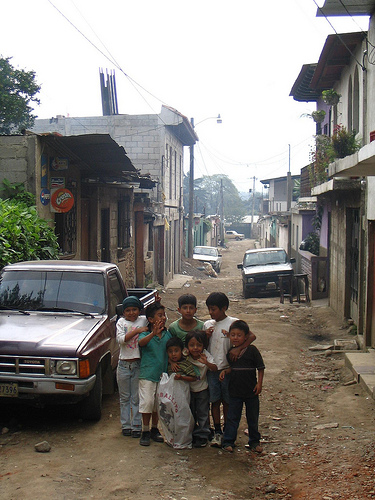11 words in Mexico City alone!
 |
| Waiters of all ages are often addressed as jóven in Mexico Photo credit: Kris Keller licensed CC BA-SY 2.0 |
niño – As expected, this word is often used for a male child here just as it would be elsewhere, but in Mexico City only, it is also used for grown-ups in quite a few contexts.
muchacho – This one is kind of outdated if used for a young boy; more often used for a male housekeeper (or muchacha for maid) in modern usage.
jóven – Jóven is sometimes used for strangers out of respect regardless of his age and also used by academics while addressing pupils but otherwise, quite outdated; also used almost as a vocative for a waiter, again, regardless of age.
vieja/chava – These are the most commonplace words for women amongst youngsters regardless of the subject women’s actual age.
chavo/cuate/tipo – These are the most commonplace words for guys amongst youngsters, chavo being considered slightly sub-standard.
 |
| Escuincle is a bit dated and rural Photo credit: Arantxa licensed CC BY-SA 2.0 |
chico – Although often used by non-Hispanics as a clichéd stereotype for a young Mexican boy or man, this word is hilariously dated, leastwise in Mexico City; only used by the members of the older generation.
güey – Now this one is iconic; nothing unites Mexicans like this alien-looking word, rich and poor alike. It comes from the word buey which refers to a castrated bull in Spanish. Originally intended as an insult (meaning “fool”), an extremely high frequency of usage in a wide range of contexts over time has meant that it has lost much of its offensive nature today. In case, you are still wondering, it roughly translates into the vocative “dude” or “buddy” of modern American English.
While the usage of güey transcends social and regional barriers, it is still considered uneducated and hence confined among friends and acquaintances. It is also considered in poor taste for a teenager to use this term for someone older. In popular culture, while Mexican television and cinema are replete with this slang, more formal programming such as news steer clear of words like güey.
Rest of Latin America
Outside of DF too, there’s an entire range of words Latinos use for boys and men, young and old alike. Here are some, if not all, of them:
cipote – Roughly means “kid” in “hey kid” in the streets of El Salvador
pibe – The Argentinean version of cipote, used for boys usually under 20; particularly commonplace in Buenos Aires
chico – Heavily used instead of niño in Argentina
chibolo – The most common Peruvian word for boys in their teens
muchacha – Mostly used for a live-in maid regardless of her age in parts of the Guatemalan Highlands and Peru and not considered polite, chica being the more polite version
 |
| In Guatemala, bratty kids are often called ishtos Photo credit: justinknabb licensed CC BY-SA 2.0 |
ishto – A common Guatemalan term for a bratty kid, not different from the Mexican escuincle
It is no surprise that there are many more words that could make this list if I had the time and resources to research solely on this subject alone. Given that Latin America is home to hundreds of indigenous tongues with unique vocabularies of their own that have nothing in common with either Spanish or even each other, such richness should be a given. In fact, it is no surprise that this kind of regional variation can be seen in almost every aspect of the Spanish vocabulary – even something as inconspicuous as a “bus!”
And finally, Europe
Spain, too, has its own street lexicon used to express the equivalent of the English “guy”. The word, chico, for instance is more common in Spain (except for the Canaries and the south) than it is in Latin America, though still not very formal (not rude either). Chico is also heard in the streets of Cuba in the sense of “hey man” or “buddy”, similar to the way it is meant in Spain. Another word Spaniards are frequently heard using is chaval which essentially means “youngster” or “kid” but often refers to another person of the same age-group as the speaker who usually happens to be a youngster himself. Spain also used the Spanish for uncle, tío , to mean a range of expressions including “fellow” or “buddy” mostly referring to young boys.
















0 comments:
Post a Comment